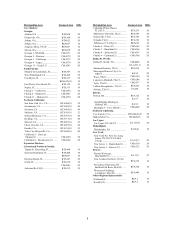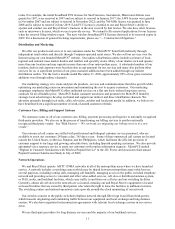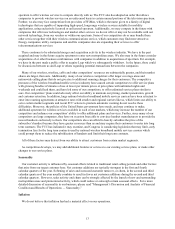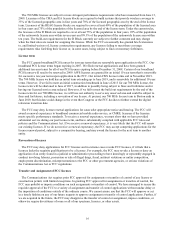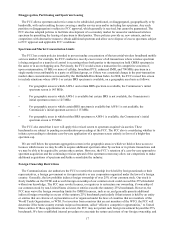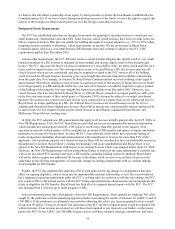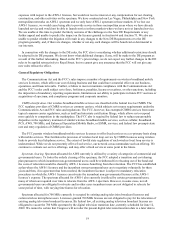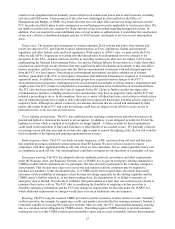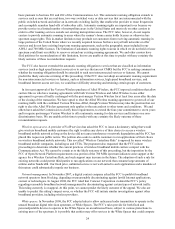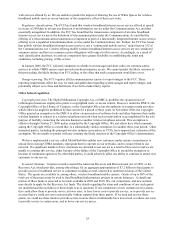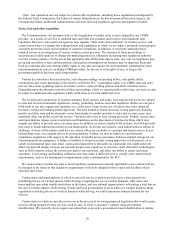Metro PCS 2008 Annual Report Download - page 25
Download and view the complete annual report
Please find page 25 of the 2008 Metro PCS annual report below. You can navigate through the pages in the report by either clicking on the pages listed below, or by using the keyword search tool below to find specific information within the annual report.16
The 700 MHz licenses are subject to more stringent performance requirements which are measured from June 13,
2009. Licensees of the CMA and EA license blocks are required to build systems that provide wireless coverage to
35% of the licensed geographic area in four years and 70% of the licensed geographic area by the end of the license
term. Licensees of the REAG license blocks are required to cover at least 40% of the population of the licensed area
in four years and 75% of the population of the licensed area by the end of the license term. Under the current rules,
the licensees of the D Block are required to cover at least 75% of the population in four years, 95% of the population
of the nationwide license area within seven years and 99.3% of the population of the nationwide license area within
ten years. The build-out requirements for the D Block currently are subject to further comment and may change
when the final rules are issued for assigning this license. While the FCC occasionally has granted brief extensions
to, and limited waivers of, license construction requirements, any licensee failing to meet these coverage
requirements risks forfeiting their license or, in some cases, being subject to fines or monetary forfeitures.
License term
The FCC grants broadband PCS licenses for ten-year terms that are renewable upon application to the FCC. Our
broadband PCS license terms began expiring in 2007. We filed renewal applications and have been granted
additional ten-year terms for all of our PCS licenses expiring before December 31, 2008. Certain of our broadband
PCS licenses will need to be renewed in 2009. AWS licenses are granted for an initial 15-year term that is renewable
for successive ten-year terms upon application to the FCC. Our initial AWS license terms end in November 2021.
The 700 MHz license we hold has an initial term extending up to June 2019, and is renewable for additional 10 year
terms. However, if we fail to meet an initial construction benchmark in June of 2013 for our 700 MHz license, the
license term will be shortened to June of 2017, in addition to possibly being subject to fines and forfeitures and/or
having our licensed service area reduced. However, if we fail to meet the build out requirements by the end of the
license term for our 700 MHz license, we will lose our authority to serve any unserved area and could be subject to
fines and forfeitures, including a revocation of our license. At present, our 700 MHz license term in Boston ends in
June 2019, but this date could change in the event that Congress or the FCC decides to further extend the digital
television transition date.
The FCC may deny license renewal applications for cause after appropriate notice and hearing. The FCC will
award a renewal expectancy to broadband commercial mobile radio service, or CMRS, licensees if the licensee
meets specific performance standards. To receive a renewal expectancy, we must show that we have provided
substantial service during our past license term, and have substantially complied with applicable FCC rules and
policies and the Communications Act. If we receive a renewal expectancy, it is very likely that the FCC will renew
our existing licenses. If we do not receive a renewal expectancy, the FCC may accept competing applications for the
license renewal period, subject to a comparative hearing, and may award the license for the next term to another
entity.
Revocation of licenses
The FCC may deny applications for FCC licenses and in extreme cases revoke FCC licenses, if it finds that a
licensee lacks the requisite qualifications to be a licensee. For example, the FCC may revoke a license or deny an
application of an entity found in a judicial or administrative proceeding to have knowingly or repeatedly engaged in
conduct involving felonies, possession or sale of illegal drugs, fraud, antitrust violations or unfair competition,
employment discrimination, misrepresentations to the FCC or other government agencies, or serious violations of
the Communications Act or FCC regulations.
Transfer and Assignment of FCC licenses
The Communications Act requires prior FCC approval for assignments or transfers of control of any license or
construction permit, with limited exceptions. In granting FCC approval for assignments or transfers of control, the
FCC may prohibit or impose conditions on such assignments or transfers of control. We have managed to secure the
requisite approval of the FCC to a variety of assignment and transfer of control applications without undue delay or
the imposition of conditions outside of the ordinary course. We cannot assure you that the FCC will approve or act
in a timely fashion on any of our future requests to approve assignment or transfer of control applications. Further, if
we are acquired in the future, the FCC may disapprove the transfer of control or assignment, impose conditions, or
otherwise require divestitures of some or all of our spectrum, licenses, or other assets.




